You know something is wrong when your betta’s stomach starts to swell and stick out.
This is a common sign of Dropsy, which is fatal if left untreated.
Dropsy is an illness where fluid builds up inside your betta, often leading to organ failure.
Recognizing symptoms before the disease progresses just might save your betta’s life.
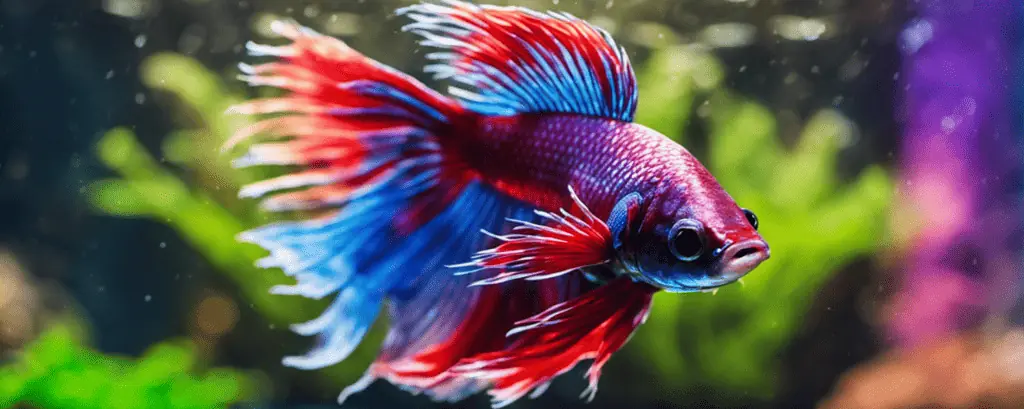
Table of Contents
What Does Dropsy Look Like in Betta Fish

Dropsy shares a lot of common symptoms with other diseases in fish. Lethargy, appetite changes, and color changes are all typical of a sick betta.
The defining characteristic of Dropsy is extreme abdominal swelling.
The bloated stomach gets so large the scales protrude a bit. You may hear it described as having a pinecone appearance.
With this in mind, here is a more complete list of symptoms:
- Swelling of the abdomen
- Lethargy
- Loss of appetite
- Changes in color
- Trouble swimming
- Stress
A lot of fish illnesses cause similar symptoms. Constipation and other kinds of bloat often cause belly swelling and appetite changes.
Swim Bladder Disease (SBD) is a common ailment where betta fish struggle to swim in their usual pattern.
Constipation bloat tends to be a lot less intense than Dropsy bloat. But your betta may also have Dropsy with constipation.
Because this is such a serious illness, any changes in stomach size must be taken seriously.
Common Causes of Dropsy

Dropsy symptoms may start for any number of reasons:
- Bacterial infection
- Poor water quality
- Sudden temperature changes
- High-fat diet
- Kidney failure
You need to understand the exact reason your fish is experiencing fluid build-up.
Treatment varies depending on what precisely is causing the excessive swelling.
Your betta’s chance of survival is also different depending on the root of the problem. Kidney failure is not as easy to fix as a bacterial infection or water quality problem.
Bacterial Infection

Sometimes an underlying health issue like an infection causes the bothersome symptoms of Dropsy.
Bacterial infections may affect any part of your betta’s body. In themselves, these infections cause a huge range of symptoms.
You may see the following:
- White sores
- Brown or white gills
- Redness/inflammation
- Bleeding
- Excess mucus
- Ragged/frayed fins
Without these symptoms, the odds are good your betta’s Dropsy has another cause.
Unsafe Water Conditions

A healthy fish tank has very low ammonia, nitrate, and nitrite levels.
A lot of common fish diseases like SBD and infections result from poor water quality.
Your betta’s body will take in unwanted chemicals without a clean tank environment.
This causes physical symptoms like cloudy eyes, fin rot, and others. But it also dampens your betta’s immune system.
A stressful environment like this leaves your freshwater fish at risk of developing infections and diseases.
In extreme cases, you even see damage to those delicate fish organs.
This is one of many ways bad water conditions put additional stress on your beloved betta.
Some common reasons people struggle to keep a clean environment for their betta are:
- Tank is too small
- Heavy bio-load
- Overfeeding
- Poor filtration
- No weekly water changes
If you need some help, no worries!
Read up here on the importance of weekly water changes and how to achieve the correct water parameters.
Temperature Changes
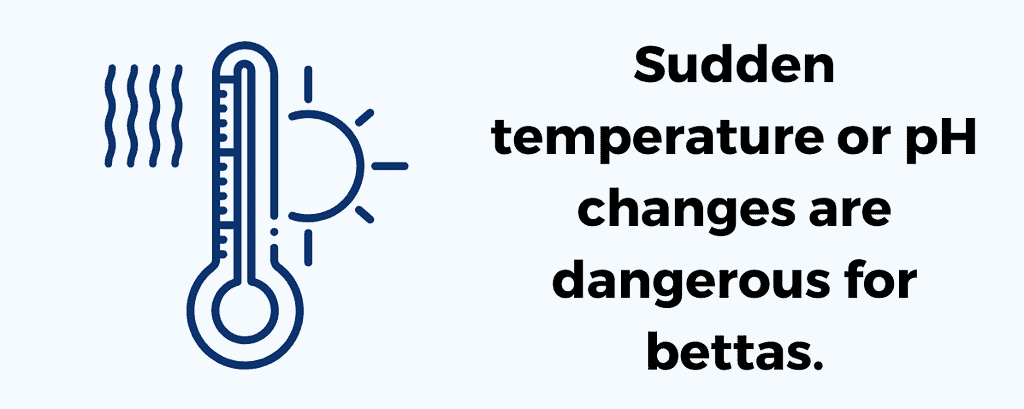
Any sudden change to the temperature or pH of your betta’s aquatic environment is dangerous.
These alterations are an added stress to your betta. They are behind many common health conditions.
For Dropsy, in particular, a dramatic drop in temperature is a possible culprit.
The cold environment is very dangerous and will wreak havoc on an otherwise healthy fish.
The ideal conditions for betta fish are keeping the tank at 78-80° degrees Fahrenheit (26-27° C).
The temperature should remain mostly stable. It may change by a degree or two every so often.
Poor Diet
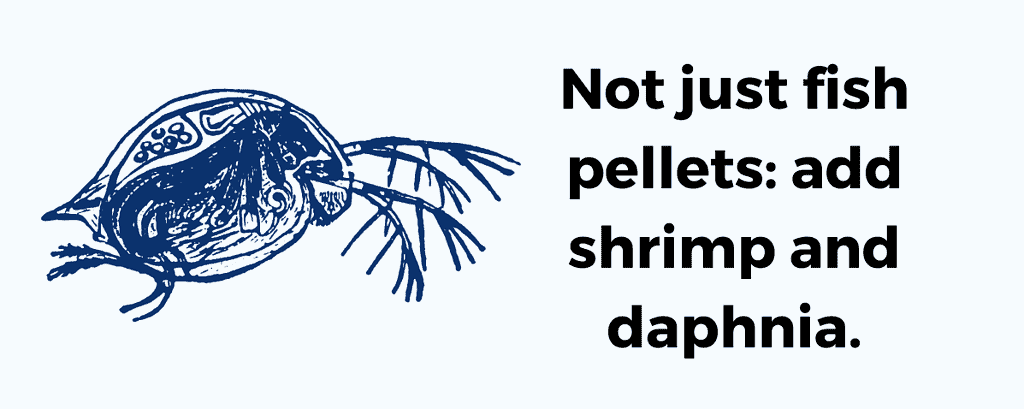
Many new fish keepers struggle to get their betta’s diet just right.
The truth is, your betta needs a high-protein diet. But the protein needs to come from the right places.
Lots of commercial foods are packed with protein. But your pet needs to eat more than just fish pellets.
Feed your fish friend various nutritious foods like live baby shrimp and daphnia.
If you want to branch out but aren’t sure where to start, read about safe food options here.
Feeding too much fat is one of the ways diet may cause Dropsy.
Whatever you feed, ensure your betta is getting a good balance of nutrients.
Protein is essential and some fat is okay. But your betta needs fiber and some vitamins once in a while!
Kidney Failure
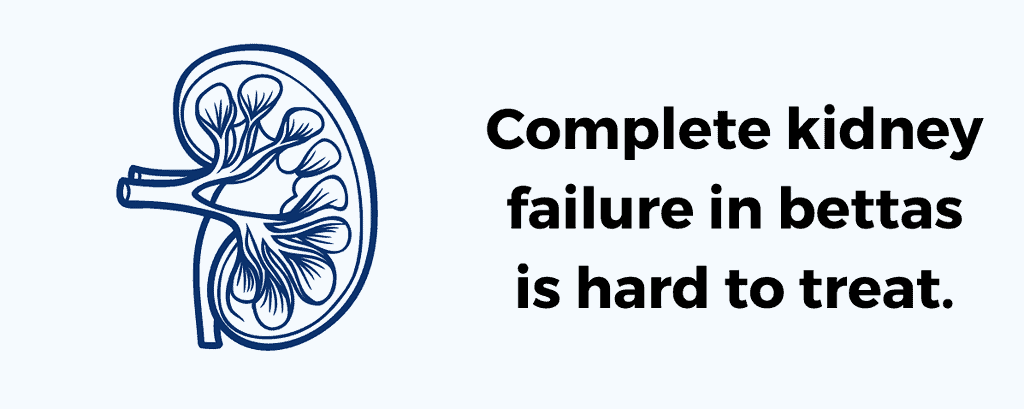
Kidney failure may lead to fluid retention in betta fish.
Dropsy is very often a sign of some sort of kidney dysfunction.
But in the case of complete kidney failure, it is difficult to treat the condition.
Pay special attention to your betta’s stomach size. The sooner you catch changes, the more likely you are to give your fish a chance of recovery.
Dropsy or Other Bloat in Stomach?

Treating a constipated betta as if they have Dropsy is detrimental.
A constipated betta may be cured simply by fasting for a few days.
A betta with Dropsy usually needs the more intensive treatment to give them a fighting chance.
By putting a constipated betta through the standard treatment period for Dropsy, you’ll stress them out.
This will not help their constipation and may even make them more vulnerable.
Remember, Dropsy causes the scales to protrude and develop a pinecone appearance.
This is the best way to tell apart Dropsy from constipation.
Treatment Options for Dropsy
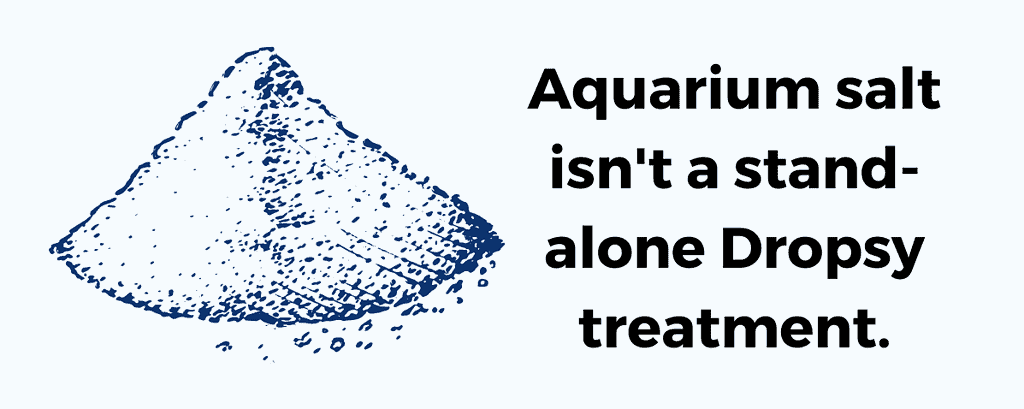
Dropsy does not magically go away. Your pet needs adequate treatment for its symptoms to improve.
The exact treatment is dependent on what causes Dropsy in your fish.
Here are some of the different methods of treating this illness:
- Hospital tank/Quarantine
- Anti-bacterial medication
- Other antibiotic medication
- Aquarium salt
Aquarium salt is not generally used as a stand-alone treatment for Dropsy.
But many people use it in their betta’s hospital tank in addition to an antibiotic.
Why Consult a Veterinarian?

Whenever your betta comes down with a serious illness, it’s a good idea to talk to an expert.
We understand this is difficult for people with aquatic pets, though. Fish-savvy veterinarians are hard to come by!
But even just a phone consultation could make a massive difference in your pet’s recovery.
Vets can better tell you the cause of your specific betta’s Dropsy.
Personalized feedback tells you whether your fish tank is a safe environment. You may learn something about infections or bloat.
Dropsy is a serious condition, and it’s always best to err on the side of caution.
At the very least, we urge you to get a second opinion from another experienced aquarist.
Importance of Quarantine
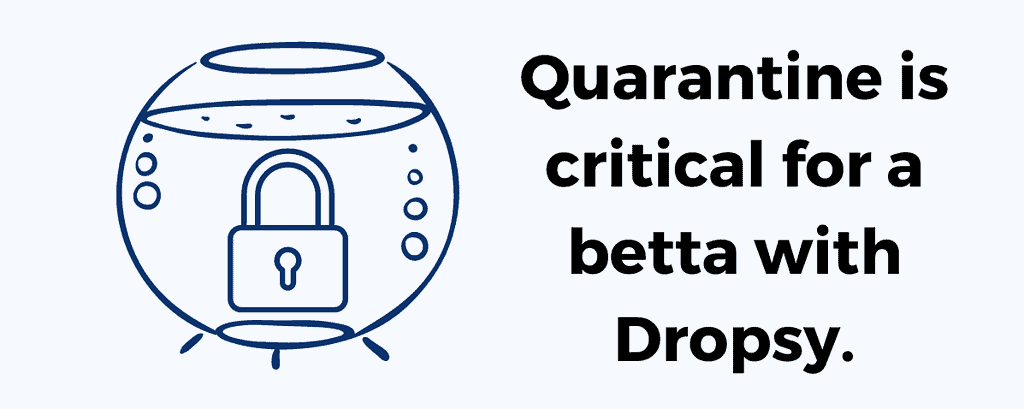
Quarantine is critical for a betta with Dropsy.
Once they have acclimated to the hospital tank, they can recover in clean water. This is where they receive medication and may have salt baths.
While it is a temporary home, make the tank comfortable.
Get an air stone and a good filter.
Make sure the water temperature is high enough. You’ll need to use a heater, just like in the standard tank.
Keep a very close eye on the water conditions in the tank. This means using testing strips frequently to monitor chemical levels.
Not only is quarantine helpful to the sick betta. But any tank mates will be safer this way too!
If the illness was caused by a bacterial infection or another contagious disease, the old tank would need a thorough cleaning.
Pros and Cons of Over-the-Counter Medications

Many OTC antibiotic medications are designed to cure sick fish with all kinds of illnesses.
They are often very effective, but the medications are not targeted to your betta’s needs.
In more serious cases, we highly recommend going to see a veterinarian.
Otherwise, here is a good betta fish Dropsy treatment available on Amazon.
Remember to follow the directions exactly and consult an expert if you feel unsure.
It’s wonderful to have medications readily available in case of emergency. But be cautious and always choose a trusted brand.
Two other effective medications for infections are Melafix and Pimafix.
But these are meant to treat specific kinds of infections. Know what you’re dealing with before buying.
The more you know about your pet’s specific problem, the more effective treatment will be.
Furthermore, OTC medications often deplete oxygen in the aquarium. This is not helpful to your pet’s recovery.
Use a good filter, air stone, or another aerator in your betta’s hospital tank.
This helps keep oxygen levels and water parameters stable as your fish heals.
Prevent Your Betta from Getting Dropsy
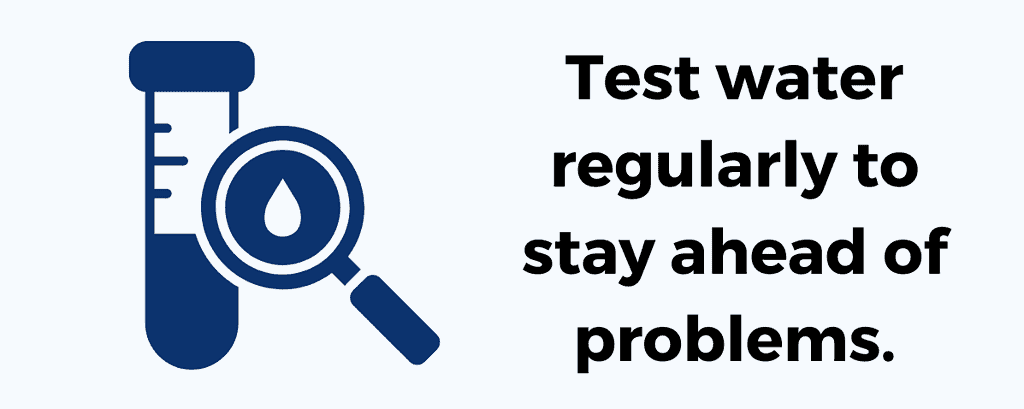
Clean Aquarium Water
The best way to prevent Dropsy in your betta is to maintain good water quality in the aquarium.
Maintaining the correct water parameters often means using a heater, a filter, an aerator, and water testing strips.
Even experienced aquarists need to test the water in their fish tank regularly. This is a way of staying ahead of any potential problems.
If you see ammonia levels starting to rise slightly, you know to perform an extra water change.
All in all, testing the water and monitoring the temperature regularly will save you a lot of headaches.
For anyone having constant problems with water quality, here are some tips:
- Get a larger tank
- Replace your filter
- Clean the substrate
- No direct sunlight
If you’d like extra help perfecting your betta’s tank set-up, read our article here.
These are all ways to exercise a little more control over your betta’s environment.
Sometimes it takes a tiny change to see a massive improvement!
A Balanced Diet

A healthy diet is critical to your betta’s health in every regard.
Good food strengthens their immune system, gives them the energy to exercise well, and encourages digestive health.
All of these things are protective factors against Dropsy and other health issues.
On the contrary, overfeeding and an imbalanced diet will worsen your betta’s health.
Overfeeding is the most common cause of constipation in betta fish.
But it may also result in a heavier bio-load.
This impacts water quality and is harmful to everyone in the fish tank.
An imbalanced diet may also lead to constipation or lethargy.
The idea is to get your fish the right amount of protein while also feeding other nutrients.
Immune System Boosters
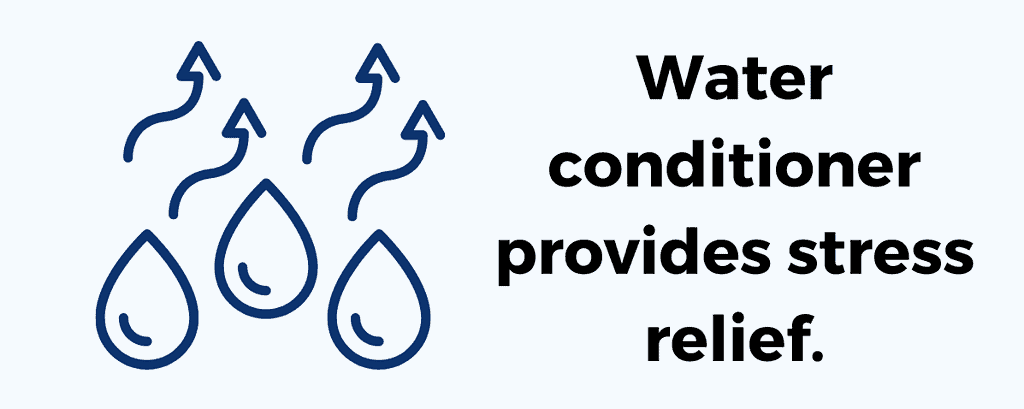
Certain betta foods and water conditioners boast immune-boosting qualities.
Don’t expect any miracles, but do give these tools a chance.
They aren’t going to harm your pet, and they have worked very well for some people.
This water conditioner, for example, treats tap water to make it safe while providing some stress relief.
Stress dampens your betta’s immune system greatly.
Prognosis for Betta Dropsy
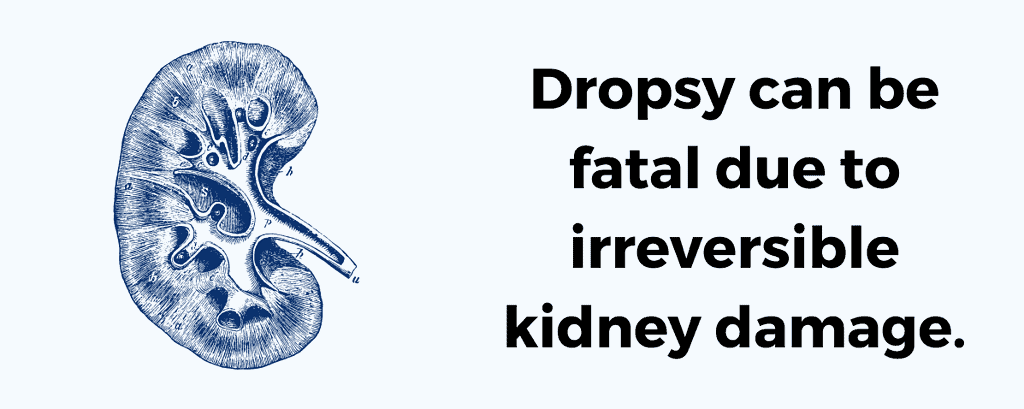
In some cases, Dropsy is a fatal illness. This is because extensive damage to your betta’s kidney cannot be reversed.
Fortunately, Dropsy is often treatable.
The odds of survival get lower the longer your fish goes untreated. So do regular checks for signs of bloating in your betta.
Bloating is dangerous even if it isn’t a result of fluid build-up.
Even constipation can turn fatal if overfeeding or poor water quality goes unchanged.
The earlier you catch symptoms of Dropsy, the more likely you are to save your fish friend.
Protecting Your Pet from Dropsy
The best way to identify Dropsy is to look for excessive belly swelling.
Your betta’s stomach scales will protrude to give them a pinecone appearance.
If you notice this symptom, your betta needs immediate help. Dropsy is sometimes indicative of kidney or other organ failures.
In these cases, it may actually kill your pet. The key to saving their life is recognizing and treating symptoms as quickly as they appear.
Antibiotics and aquarium salt are the most common methods of treatment.
But prevention is equally important, which means providing good water quality and a balanced diet!


